#hire telemedicine app developers
Text
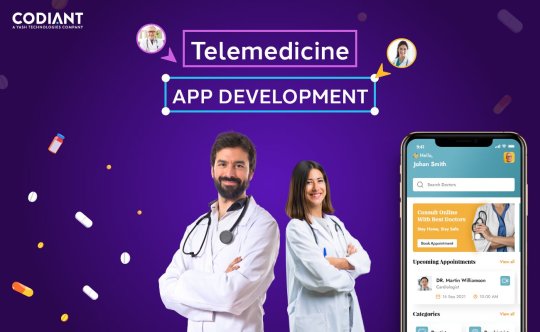
Teledocto- Market ready Telehealth app for doctors with specific features
Teledocto is a white labelled mobile app which can customized easily according to your business need of telemedicine services. It has in-build features of online scheduling file and screen sharing, remote monitoring. Let us help you with your ideas!!
#telemedicine app development services#telemedicine app development#telemedicine software development#telemedicine app development company#telehealth app development#telehealth app development company#hire telemedicine app developers
0 notes
Text
HIPAA Innovators: Unleashing Healthcare's Interoperable Revolution
The Health Insurance Portability and Accountability Act (HIPAA) was enacted in 1996 to safeguard patient data and ensure the privacy and security of health information. Over the years, HIPAA has significantly influenced the healthcare industry, shaping how organizations manage patient information, enhance security measures, and adopt new technologies. This article explores HIPAA's impact on the healthcare industry, providing relevant statistics and insights from various sources.
Strengthening Patient Privacy and Security
HIPAA's primary objective is to protect patient information from unauthorized access and breaches. According to the HIPAA Journal, since the implementation of HIPAA, healthcare organizations have improved their data protection measures, reducing the risk of data breaches. A report from the Department of Health and Human Services (HHS) reveals that in 2020 alone, there were 642 healthcare data breaches affecting over 29.3 million individuals. This highlights the critical need for stringent data security protocols mandated by HIPAA.
Enhancing Trust and Patient Confidence
The enactment of HIPAA has fostered greater trust between patients and healthcare providers. Patients are more confident that their personal and medical information is handled with the utmost care and confidentiality. According to a survey by the American Medical Association (AMA), 87% of patients believe that their health information is protected due to HIPAA regulations. This increased trust encourages patients to share sensitive information with their healthcare providers, leading to better diagnosis and treatment outcomes.
Impact on Healthcare Technology and Telemedicine
HIPAA has also significantly impacted the adoption and development of healthcare technology, particularly in the realm of telemedicine. Telemedicine apps for doctors must comply with HIPAA regulations to ensure patient data privacy and security. The growth of telemedicine, accelerated by the COVID-19 pandemic, has been supported by HIPAA-compliant solutions, allowing healthcare providers to offer remote consultations and services.
A report by Mobisoft Infotech highlights that the demand for custom telemedicine app development solutions has surged, with an estimated market growth rate of 23.5% from 2020 to 2027. HIPAA compliance is a critical factor in this growth, as it reassures patients and providers that their interactions and data are secure.
Compliance and Administrative Burden
While HIPAA has brought numerous benefits, it has also introduced compliance challenges for healthcare organizations. Ensuring compliance with HIPAA regulations requires significant administrative effort and resources. Healthcare providers must implement comprehensive training programs, regular audits, and robust security measures to remain compliant.
A study by Secureframe found that healthcare organizations spend an average of $8.3 million annually on compliance activities. Despite the financial and administrative burden, these efforts are essential to protect patient information and avoid hefty fines for non-compliance. The HHS has issued fines totaling over $130 million since 2003 for HIPAA violations, emphasizing the importance of adherence to these regulations.
Benefits of HIPAA for the Healthcare Industry
HIPAA has played a crucial role in transforming the healthcare industry by introducing standards that enhance efficiency, combat fraud, and ensure continuity of health insurance coverage for individuals between jobs. The legislation has provided a clear set of rules for healthcare professionals to follow regarding the protection of patient data, leading to improved care delivery and patient outcomes. Additionally, HIPAA has facilitated the transition from paper-based medical records to Electronic Health Records (EHRs), enabling secure access to patient information, enhancing care coordination, and reducing medical errors.
Promoting Innovation and Interoperability
HIPAA has also driven innovation in healthcare technology by promoting the adoption of interoperable systems. The need to comply with HIPAA standards has led to the development of secure EHR systems and other digital health solutions. These innovations facilitate the seamless exchange of information between healthcare providers, enhancing the quality of care and patient outcomes.
The HHS Office of the National Coordinator for Health Information Technology (ONC) reports that 86% of office-based physicians and 96% of hospitals use EHR systems. The interoperability of these systems, driven by HIPAA standards, allows for better coordination and continuity of care, especially in complex cases requiring multiple healthcare providers.
Challenges and Criticisms
Despite its benefits, HIPAA has faced criticism for its complexity and the burden it places on healthcare organizations. Critics argue that the stringent requirements can be overwhelming, particularly for smaller practices with limited resources. The complexity of HIPAA regulations can also lead to inadvertent violations, resulting in penalties that could financially strain healthcare providers.
Moreover, the rapid advancement of technology presents ongoing challenges for HIPAA compliance. As new technologies emerge, healthcare organizations must continuously update their systems and protocols to remain compliant. This dynamic landscape requires ongoing education and adaptation, which can be resource-intensive.
Future Outlook
As the healthcare industry continues to evolve, HIPAA will remain a cornerstone of patient privacy and data security. The rise of telemedicine, driven by the need for remote healthcare services, will further emphasize the importance of HIPAA-compliant telemedicine app development services. Healthcare providers and technology developers must collaborate to create innovative solutions that meet HIPAA standards while addressing the growing demand for digital health services.
In the future, HIPAA regulations may need to adapt to address new challenges posed by emerging technologies such as artificial intelligence (AI) and the Internet of Things (IoT). These technologies have the potential to revolutionize healthcare but also introduce new risks to patient data privacy and security. Policymakers must balance innovation with robust data protection measures to ensure that the benefits of these technologies are realized without compromising patient trust.
Conclusion
HIPAA has profoundly impacted the healthcare industry by enhancing patient privacy, promoting trust, and driving the adoption of secure healthcare and life science technologies. While it presents compliance challenges, the benefits of HIPAA in protecting patient information and fostering innovation are undeniable. As the industry continues to embrace digital health solutions, HIPAA will play a crucial role in ensuring that patient data remains secure in an increasingly interconnected world. The ongoing evolution of HIPAA regulations will be essential to address new technological advancements and maintain the integrity of patient information.
#telehealth#hire developers#hire app developer#mobile app development#hire mobile app developers#telemedicine
0 notes
Text
Doctor Appointment App Development Company with Plassey Technologies
In today's fast-paced world, the healthcare industry is embracing technology like never before. Doctor appointment apps have become indispensable tools, offering convenience and efficiency to both patients and healthcare providers. As the demand for such apps continues to soar, it's crucial for Doctor Appointment App Development Companies to ensure they offer essential features that meet the evolving needs of users.
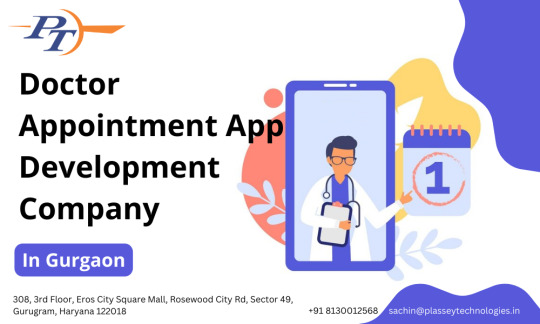
User-Friendly Interface
A seamless user experience is paramount in the success of any doctor appointment app. A Doctor Appointment App Development Company must prioritize creating an intuitive interface that simplifies appointment scheduling, enables easy navigation, and provides clear information at every step. By prioritizing user-friendliness, these companies can enhance user satisfaction and retention rates.
Secure Data Handling
With the sensitive nature of healthcare data, security is non-negotiable. A reputable Doctor Appointment App Development Company prioritizes robust data encryption, adherence to HIPAA regulations, and secure storage practices. By implementing stringent security measures, these companies instill trust and confidence in both patients and healthcare providers.
Integration with Electronic Health Records (EHR) Systems
Seamless integration with EHR systems is essential for enhancing efficiency and accuracy in healthcare delivery. A leading Doctor Appointment App Development Company ensures smooth communication between the appointment app and EHR systems, enabling healthcare providers to access patient history, streamline appointment scheduling, and facilitate better care coordination.
Real-Time Notifications and Reminders
To minimize appointment no-shows and improve patient engagement, real-time notifications and reminders are indispensable. A forward-thinking Doctor Appointment App Development Company incorporates customizable reminder settings, appointment confirmations, and push notifications, keeping patients informed and engaged throughout their healthcare journey.
Telemedicine Capabilities
In today's digital age, telemedicine has emerged as a vital component of healthcare delivery. A progressive Doctor Appointment App Development Company integrates telemedicine features seamlessly into their apps, enabling virtual consultations and expanding access to healthcare services. By embracing telemedicine, these companies empower patients to receive quality care from the comfort of their homes.
Conclusion
As the healthcare landscape continues to evolve, Doctor Appointment App Development Companies play a pivotal role in driving innovation and improving healthcare accessibility. By prioritizing essential features such as user-friendly interfaces, secure data handling, EHR integration, real-time notifications, and telemedicine capabilities, these companies are revolutionizing the way healthcare is delivered and experienced.
Plassey Technologies services are:
best fitness app developersCar Hire Application Development
Doctor Appointment App Development Company
Grocery Delivery App Development Company
custom medical software development services
Taxi Booking App Development Company in India
Affordable Digital Marketing Company in India
0 notes
Text
AngularJS in Healthcare Industry
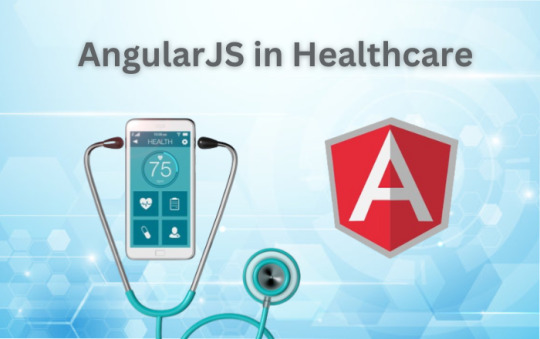
Introduction
Web applications have become integral to corporate operations across various industries in today's dynamic landscape. Selecting the ideal web development framework to elevate apps from excellent to outstanding is now crucial for organizations due to the increasing demand for robust and user-friendly web applications. In healthcare, AngularJS has been used to create powerful and user-friendly web applications, where effective information management is crucial for resolving and elevating overall healthcare service standards.
About AngularJS
AngularJS is one of the most compelling JavaScript-based front-end web application frameworks designed to develop single-page web applications (SPAs). It makes it easier for software developers to create powerful and feature-rich applications by implementing strong data-binding features and expanding the HTML syntax. Furthermore, it is crucial to note that Angular and AngularJS are different. Since it's open source, anyone can use or modify it. AngularJS offers services, modules, and filters that provide a comprehensive framework for developing dynamic web applications.
The benefits of AngularJS for healthcare web apps
Improved Performance- The performance of web applications is significant, particularly in the healthcare industry, where accurate and timely information can save lives. Angular provides tools to improve the performance of applications, enabling quick loads and streamlined user experience, increasing productivity within healthcare organizations.
Cross-platform Compatibility- Healthcare professionals utilize different devices like mobile phones, laptops, desktops, and tablets to access healthcare-related information and programs. AngularJS web applications are designed to be responsive, compatible, and optimized for various devices.
User-friendly Interface- Creating a user-friendly Interface is made less challenging by AngularJS's declarative templates and data binding. It is essential for healthcare organizations, as user-friendly interfaces are necessary for effective data entry and retrieval, lowering the chances of errors.
Streamlined Processes- AngularJS can lessen the load of paperwork and improve operational effectiveness. Appointment scheduling, insurance claim processing, billing, and other healthcare-related functions can be updated, automated, simplified, and customized with AngularJS web applications. Hire AngularJS developers who specialize in creating unique healthcare systems catered to your particular requirements and to improve your healthcare technology solutions.
Integration of AngularJS in healthcare web apps
Angular is a feature-rich and flexible framework that can be used to develop various web applications for the healthcare industry.
EHR Systems- Patient records can be digitized through Electronic Health Record Systems. With access to a centralized system, patient data can be updated at any moment, including diagnosis, recommended course of treatment, along with past medical records.
Hospital Management Software- With AngularJS, it is easy to design web applications that can effectively manage hospital operations. Administrative duties, such as booking appointments (by verifying the availability of doctors), billing, insurance claiming, and communicating with patients, can be simplified.
Telemedicine Platforms- Telemedicine platforms designed with AngularJS enable video conferencing, medical data sharing, and secure messaging. It helps in online consultations between healthcare professionals and patients, particularly those who live in remote areas or cannot commute to the hospital.
Pharmacy Management System- Pharmacy operations, such as order fulfillment, prescription processing, and inventory management, can be handled via pharmacy web applications. The modular architecture of AngularJS can help develop scalable systems that adapt to the changing needs of pharmacies.
The Future Outlook for AngularJS in Healthcare Industry
The future outlook of AngularJS in the healthcare industry seems optimistic since the framework is expected to have a significant influence on the development of the upcoming wave of healthcare applications.
Improved Patient Engagement- Patient-centric care is becoming more and more of an emphasis. Personalized portals, mobile apps, and interactive tools airfare are just a few examples of dynamic and user-friendly interfaces that can be designed using AngularJS to empower more patients to engage.
Combining Emerging Technologies- AngularJS's modular structure and flexibility make it well-suited to adapt emerging technologies such as artificial intelligence, machine learning, and the Internet of Things to meet the evolving needs of healthcare applications.
Measures for Cybersecurity- The framework's capacity to set strong security measures into operation will aid in resolving the growing concerns about patient data privacy and compliance with changing healthcare standards.
Conclusion
In the Healthcare Industry, AngularJS is a robust and adaptable framework that is a technology improvement and a transformative experience for organizational and operational methods. Its scalability, maintainability, and cross-platform compatibility facilitate the framework's responses to the constantly changing healthcare sector. AngularJS's built-in security features address the critical issue of protecting sensitive medical data. Let's entrust a reputable healthcare software development company as a reliable collaborator in providing the best possible treatment, utilizing resources effectively, and ensuring compliance with all healthcare laws.
#technology#software company#angularjs#healthcare software development#software developers#angular developers#angular development services#angular development company
1 note
·
View note
Text
What to Look for in a Healthcare App Development Company?
Is the creation of a healthcare app something you're considering funding? What factors should be taken into account before an app is created? Before committing to a healthcare app development firm, you should do extensive homework. They are glad to recognize you as one of the many healthcare organizations with which they have collaborated.
In this article, we'll review everything you should consider and tick off before hiring a healthcare app development agency. Instead of listing factors, we'll explain how to find the best healthcare app developers. Let's begin. Here are some healthcare digitalization facts.
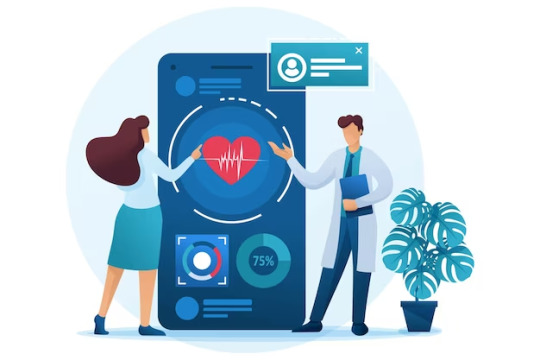
Importance of Health-Related App Creation
Apps that help in the healthcare industry have become increasingly popular because of the positive effects they have on patient outcomes, workplace productivity, and information accessibility. These mobile programs may be anything from a telemedicine portal to a fitness tracker or a patient management program. Your healthcare app will only be as good as the development team you hire, no matter the scenario in which it will be used.
Key Considerations for Finding the Perfect Companion
Tips for Finding the Perfect Companion
Professional Medical Experience:
The healthcare industry has specific rules, compliance standards, and quirks. It is critical to work with a company that has experience creating healthcare apps. Find a healthcare app development agency that has experience with healthcare's unique set of problems and difficulties.
Compliance with Requirements:
In the US, HIPAA mandates strict healthcare app criteria. Ask the company about its compliance understanding and ability to design a secure app.
Case Studies and Portfolios:
You can tell a lot about a company's ability to deliver a healthcare app by looking at their previous work and case studies. Take note of the various projects presented, as well as any examples of completed work or praise from satisfied customers. This will give you insights into their talents and track record.
Precautions for Safety:
The creation of secure healthcare apps is of utmost importance. Find out what precautions the healthcare app development agency takes to protect the confidentiality of patient information. Secure data storage, access controls, and encryption are all crucial features.
Method of Construction:
Learn how healthcare software development services grow and change. Are they experienced with agile development methodologies? You can only build an app with proper project management, communication, and teamwork.
Technologies and Platforms for Mobile Devices:
Consider whether your app will run on iOS, Android, or both and whether the company specializes in native or cross-platform development when making your decision. Verify that the company can build for the platforms you want to use.
Capabilities for Integration:
Integration with pre-existing healthcare infrastructure is a common requirement for healthcare apps. Verify if the organization has worked with healthcare IT systems like Electronic Medical Records (EMRs) before hiring them.
Conclusion:
If you want your healthcare app to be a success, you need to make sure you work with the correct app development company. Regulatory compliance, a solid portfolio, and healthcare software development services experience should be top priorities. Find a collaborator like smartData with experience in app development and familiarity with the platforms and technologies you need, a large development process, and the right security measures to keep your healthcare app popular and useful. Consider these factors to make an informed selection and start designing a healthcare app to benefit your business and the healthcare community.
Also Read:
Revolutionizing Healthcare: The Power of Software Development Services
#healthcare software development services#healthcare app development agency#healthcare app development
0 notes
Text
Enhancing Medicare through Healthcare App Development Services
Squillion Technology is harnessing the potential of app development to enhance the accessibility, efficiency, and patient-centricity of the healthcare system. Our apps include features such as appointment scheduling, patient record management, telemedicine services, and more, providing users with unparalleled convenience.
Read more https://www.squillion.tech/services/healthcare-app-development/
#healthcare app development#medical app development#health app development company#healthcare app development company
0 notes
Text
Finding Your Ideal White Label TeleHealth Solutions
The healthcare industry is rapidly adopting telemedicine app development solutions to improve patient access and outcomes. With telehealth, patients can consult doctors through video conferences, eliminating geographical barriers. Healthcare organizations can also cut costs and free up clinical staff's time with remote patient monitoring.

Image
As telehealth software solutions gain popularity, many healthcare providers want to launch their own telemedicine app services. Building a telehealth platform from scratch requires time and significant investment. That's where white label telehealth solutions come in. White labeling allows you to launch a branded telehealth service backed by an established technology platform.
In this blog post, we will explore:
- The benefits of white label telehealth software solutions for telemedicine apps
- Factors to consider when choosing a provider
- Features to look for in a robust platform
- Real-world examples of successful implementations
- FAQs on white labeling telehealth and telemedicine.
Let's get started!
Benefits of White Label Telehealth Solutions for Telemedicine Apps
White labeling telehealth software solutions offers many advantages over building your own platform:
Fast time-to-market: With an off-the-shelf solution, you can launch within weeks instead of months.
Lower upfront costs: No need to invest in developing technology and hiring engineers.
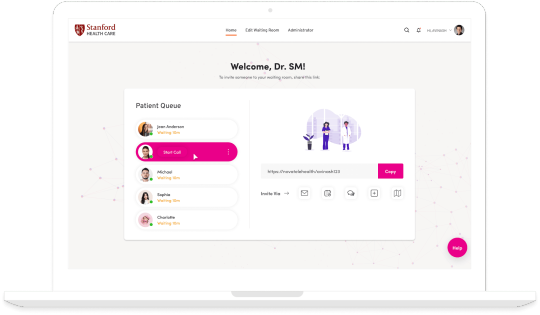
Image
Flexible scaling: White label platforms, suitable for telemedicine app development, easily scale as your user base grows.
Latest features: Leverage innovations like AI diagnosis and asynchronous messaging.
Regulatory compliance: Established platforms ensure compliance with healthcare regulations.
Proven technology: Avoid technology risks and glitches of untested software..
6 Critical Factors to Consider in a White Label Telehealth Partner
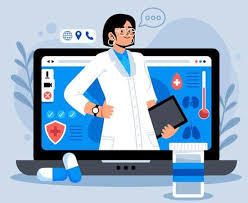
Image
With many vendors offering white label telehealth software solutions, how do you select the right partner for your telemedicine apps?
Here are key factors to consider:
1. Proven Experience and Expertise
Partner with an established telehealth vendor with many years of experience, not a new entrant. Look for proven success delivering similar large-scale implementations in your industry.
Ask for case studies and client references to verify capabilities. Seek out partners who stay ahead of evolving regulations and guidelines.
2. Flexible Business and Pricing Models
Avoid vendors who lock you into long, rigid contracts. Look for partners offering customized options that meet your budget and scale as your program grows. Month-to-month fees, revenue sharing models, and usage-based pricing give you flexibility.
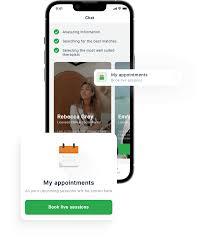
Image
3. Robust and Configurable Technology Platform
Assess the provider's technology stack and architecture. Key elements include:
- Native mobile apps for omni-channel access, crucial for telemedicine app development
- APIs for easy integration with EHRs and internal tools
- Configurable clinical workflows
- AI capabilities like automated triage and health risk assessments
- Analytics dashboards and custom reporting
Prioritize scalable platforms that give you control to tailor experiences.
4. Extensive Practitioner Network and Staffing Models
Having on-demand access to licensed, credentialed clinicians is a must. Verify the provider has a nationwide practitioner network across primary care, behavioral health, and specialties. Also confirm they support leveraging your own employed doctors.
5. Medical Operations and Compliance
A partner handling the medical side is critical for speed. Ensure they provide intake processing, eligibility checking, documentation and other operational support. Rigorously vet their protocols for clinician vetting, licensing, credentialing and training.

Image
6. Implementation Support and Post-Launch Partnership
The right partner doesn't just hand off software and leave. Look for dedicated support for change management, rollout, training and optimization. Conduct user acceptance testing before launch. After launch, seek ongoing enhancements, new feature releases, quarterly business reviews, and 24/7 technical assistance.
Now that we've covered the partner evaluation criteria, let's explore the technical capabilities your platform should deliver.
Must-Have Features in a Robust Telehealth Platform for Telemedicine Apps
The telehealth solution should provide a stellar experience for providers and patients, especially for telemedicine apps. These features are vital:
Key Video Visit Capabilities
Telehealth Platform Remote Monitoring Features
HD video resolution (720p+)
Connectivity for Bluetooth peripherals (scales, BP monitors, glucose meters)
Screen sharing
Custom surveys and chronicle care management prompts
Remote camera control
Automated health metric data analysis and trend identification
HIPAA-compliant infrastructure
Patient engagement tools (reminders, education, chat)
For Patients
- Intuitive mobile app for on-the-go access
- Secure video consultations with screen sharing
- Remote patient monitoring with connected devices
- Asynchronous messaging for non-urgent inquiries
- Prescription management and integration with pharmacies
- Payment and billing management
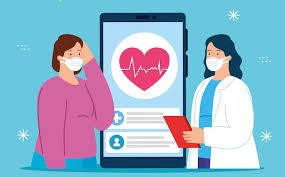
Image
For Providers
- Provider mobile app and web portal
- Tools to manage patient appointments and records
- Telehealth workflow directly integrated with EHR
- ePrescribing and prescription tracking
- Secure video calls with remote diagnostic tools
- Asynchronous messaging threads with patients
- Referrals management and transitions of care
Administrative Features
- Performance dashboards and analytics
- Custom reporting on utilization and outcomes
- Patient management tools
- Configurable settings for providers, services, locations
- Robust data security and access controls
- HIPAA-compliant messaging and infrastructure
- Integrations with billing, claims, and EHR systems
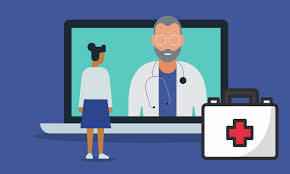
Image
Implementation and Support
- Quick onboarding and training
- Technical and clinical support teams
- Ongoing platform enhancements and feature releases
- User acceptance testing and change management
- Custom integrations with internal systems
- Scalable infrastructure and backups
FAQs on White Label Telehealth Solutions
Can we integrate a white label telehealth platform with our EHR?
Yes, reputed providers enable easy integration with EHRs via APIs and HL7 interconnectivity. This allows a seamless workflow for telemedicine app development.
How long does implementing a white label telehealth solution take?
With an experienced partner, you can launch a branded telehealth service in 4-6 weeks. The vendor handles technical setup while you focus on change management and marketing for your telemedicine applications.
What telehealth trends are shaping the industry in 2023?
Top telehealth trends include greater chronic care management, expansion into mental health services, integration with in-person care, and enterprise-grade capabilities like automation and analytics.
These trends significantly improve the landscape of telemedicine app development.
How does telehealth benefit healthcare organizations?
Key benefits include increased patient access, reduced costs through avoided emergency department visits, improved outcomes and patient satisfaction, expanded revenue with new virtual care services, and optimized clinician workflows for telemedicine apps.
What telehealth modalities are available?
Platforms offer live video consultations, remote patient monitoring with connected devices, asynchronous messaging, e-prescription management, mental health therapy, nutrition services, and more for comprehensive telemedicine app development.
Conclusion
Telemedicine app development industry is transforming healthcare access and delivery. White label solutions allow even small to mid-sized healthcare organizations to quickly deploy telehealth software solutions at scale. The key is choosing an experienced technology partner that provides a robust and customizable platform.
If you're looking for a proven telehealth app development provider, connect with Consagous Technologies, a leading telemedicine app development company. With over a decade of experience delivering custom healthcare software and mobile apps, Consagous is a leading innovator in white label telehealth solutions. Schedule a free demo to learn more about their HIPAA-compliant platform, flexible business models, and successful client deployments.
You can rapidly launch telehealth under your brand backed by cutting-edge technology and stellar support. Contact to get started!
0 notes
Text
Top App Developers and android app development Winnipeg
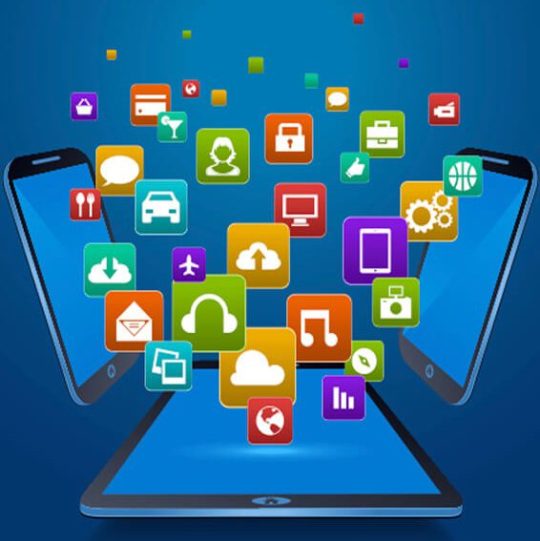
bout a telemedicine app. Namsoftwares did the app and ensured healthcare compliance. With its popularity among Winnipeg doctors and patients, the app has transformed medical consultations.
Namsoftwares was hired to create a mobile app to improve an e-commerce retailer's customer experience. Customers were engaged by the app, which increased sales and loyalty.
Finally:
Due to business and personal digital transformation, Winnipeg app developers are in high demand. In this market, Namsoftwares leads with expert, customer-centric, and innovative Android app development services.
Through customized solutions, user-centric design, and ongoing support, Namsoftwares has helped Winnipeg businesses and individuals leverage mobile apps. In Winnipeg's digital growth, Namsoftwares leads tech innovation. Namsoftwares is Android app development Winnipeg partner for businesses and individuals with innovative app ideas.
0 notes
Text
Top App Developers and android app development Winnipeg
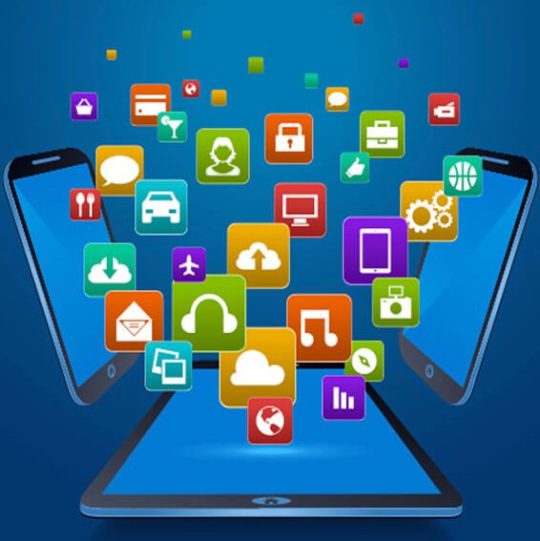
bout a telemedicine app. Namsoftwares did the app and ensured healthcare compliance. With its popularity among Winnipeg doctors and patients, the app has transformed medical consultations.
Namsoftwares was hired to create a mobile app to improve an e-commerce retailer's customer experience. Customers were engaged by the app, which increased sales and loyalty.
Finally:
Due to business and personal digital transformation, Winnipeg app developers are in high demand. In this market, Namsoftwares leads with expert, customer-centric, and innovative Android app development services.
Through customized solutions, user-centric design, and ongoing support, Namsoftwares has helped Winnipeg businesses and individuals leverage mobile apps. In Winnipeg's digital growth, Namsoftwares leads tech innovation. Namsoftwares is Android app development Winnipeg partner for businesses and individuals with innovative app ideas.
0 notes
Text
How Can Staff Augmentation Services Help Startups Scale Their Development Teams?
Startups often face unique challenges when it comes to building and scaling their development teams. The demand for talented tech professionals can be high, but budgets are often limited. That's where staff augmentation services company like Expedite Software Services come into play. we will explore how staff augmentation services can be a game-changer for startups looking to scale their development teams efficiently and cost-effectively.
The Startup Dilemma
Startups are known for their agility, innovation, and ability to disrupt industries. However, they also operate under tight budgets and timelines. When it comes to building a development team, startups often face several challenges:
1. Limited Resources: Startups may not have the resources to hire full-time, in-house developers with the required skill set.
2. Rapid Growth: Successful startups often experience sudden growth, and scaling the development team quickly is crucial to meet market demands.
3. Specialized Skills: Startups may require specialized skills for specific projects, which can be hard to find locally.
4. Cost Constraints: Cost-effective solutions are paramount for startups to allocate resources wisely.
The Role of Staff Augmentation
top staff augmentation companies in India, Staff augmentation is a flexible and strategic solution for startups aiming to overcome these challenges. Expedite Software Services provides access to a global talent pool of highly skilled and experienced developers who can seamlessly integrate with your existing team. Here's how staff augmentation can help startups scale their development teams:
1. Rapid Team Expansion: When a startup experiences growth or needs to meet tight deadlines, staff augmentation allows for rapid team expansion. Expedite Software Services can provide qualified developers in a matter of days, reducing the time-to-market for your product or project.
2. Cost Savings: Hiring full-time employees can be expensive, especially for startups with budget constraints. With staff augmentation, you can access top talent without the overhead costs associated with recruitment, training, and benefits.
3. Specialized Skills: For projects requiring specific expertise, Expedite Software Services can match you with developers who possess the exact skills you need. Whether it's blockchain development, AI, or mobile app development, we have specialists ready to assist.
4. Flexibility: Staff augmentation is incredibly flexible. You can scale your team up or down as needed, depending on project requirements. This adaptability allows startups to efficiently allocate resources without long-term commitments.
5. Focus on Core Competencies: By outsourcing certain development tasks to our experts, startups can free up their in-house team to focus on core business activities, such as product innovation and market strategy.
6. Global Talent Pool: Expedite Software Services has access to a diverse talent pool, including developers from around the world. This global reach enables startups to tap into a wide range of skills and cultural perspectives.
7. Reduced Risk: Expedite Software Services takes care of the administrative aspects, such as payroll and HR management, reducing the administrative burden on startups.
Success Stories with Expedite Software Services
Several startups have benefited from Expedite Software Services' staff augmentation solutions. Here are a few success stories:
1. Speedy Product Launch: A healthcare startup needed to accelerate the development of a telemedicine platform. Expedite Software Services provided a team of experienced developers who helped the startup launch their product on time, capturing a significant market share.
2. Cost Efficiency: A fintech startup was looking to build a mobile payment app but had budget constraints. By utilizing staff augmentation, they saved 40% of their development costs compared to hiring full-time developers.
3. Access to Niche Skills: A cybersecurity startup requires expertise in penetration testing and threat analysis. Expedite Software Services connected them with security specialists, enhancing their product's security features.
In the fast-paced world of startups, having the right development team can make or break your success. Staff augmentation services from Expedite Software Services offer a strategic advantage by providing rapid access to top talent, specialized skills, and cost-effective solutions. As startups continue to disrupt industries, staff augmentation is a powerful tool that can help them achieve their goals and thrive in competitive markets. If you're a startup looking to scale your development team efficiently and effectively, consider partnering with Expedite Software Services for a brighter, more agile future.
Source Link
#staff augmentation solutions#staff augmentation services in India#staff augmentation company in India#staff augmentation firm in India#it staff augmentation companies in India#staff augmentation services company#top staff augmentation companies in India
0 notes
Text

Our experts have listed the key points for developing a customized Telemedicine app. Save this list to make sure your app stands out from your competitors.
Keeping the Telemedicine App User-Friendly
Ensuring the Essential Feature Set of Telemedicine
Hiring Experienced Telemedicine App Developers
Managing Costs and Timeline for Development
Seamless Integration with Third-Party Systems
Prioritizing Data Security and Privacy
Healthcare Regulatory and Security Compliance
Custom Telemedicine App Development for Specialty Care
Uninterrupted Care Delivery with Telemedicine
Enhancing User Experience with Additional Features
The concept of Telemedicine is growing. It is making healthcare easy to access and affordable. But it takes a lot of work and effort to make it happen. It takes the well-thought-out planning of a provider and the skill of a developer. If skill, planning, and implementation come in the right proportion, it makes a great app.
#Telemedicine App Developers#telemedicine app development#telemedicine#telehealth#doctorapp#telemedicine app#emedhealthtech
0 notes
Text
Teledocto is market ready white labelled telemedicine app with in build features of serving health services online scheduling, real time messaging & integrated billing. Get a quote for quick start your business or transformation.
#telemedicine app development services#telemedicine app development#telemedicine software development -#telemedicine software development#telemedicine app development company#telehealth app development#telehealth app development company#hire telemedicine app developers
0 notes
Text
Enhancing Patient Care Through Innovative eHealth Solutions
In the rapidly evolving healthcare landscape, the terms "eHealth" and "telemedicine" are often used interchangeably, leading to confusion and misconceptions. However, these two concepts, while related, possess distinct characteristics and applications. This article aims to shed light on the differences between eHealth and telemedicine, enabling a better understanding of their respective roles in transforming healthcare delivery.
Understanding eHealth: A Comprehensive Approach
eHealth, or electronic health, is an umbrella term that encompasses a wide range of technologies and services designed to enhance healthcare delivery, information exchange, and communication. It encompasses various aspects of healthcare, including electronic health records (EHRs), mobile health (mHealth) applications, telehealth, and more.
eHealth app development focuses on creating digital solutions that improve healthcare accessibility, efficiency, and patient engagement. These applications can include patient portals, health trackers, appointment scheduling tools, and remote monitoring systems, among others.
Key Aspects of eHealth:
Data Management and Exchange
eHealth enhances healthcare by improving data management and exchange, facilitating seamless information flow across systems. It centralizes health data electronically, reducing errors and improving care quality. Interoperable systems promote collaboration, enhancing patient outcomes and promoting secure data exchange between healthcare entities.
Patient Empowerment and Education
eHealth is a digital health approach that empowers patients by providing them with resources, educational materials, and tools to actively manage their health. This approach fosters a culture of informed decision-making and self-care, improving patient outcomes and overall well-being through mobile health apps and online platforms.
Healthcare Administration and Management
eHealth is revolutionizing healthcare administration by digitizing administrative processes like appointment scheduling, billing, and inventory management. Electronic health records centralize patient information, enhancing efficiency and workflow. This digital transformation improves coordination among healthcare teams, leading to better patient care and outcomes.
Public Health Initiatives
eHealth initiatives in public health promote population health and preventive care by using digital platforms to disseminate vital information, track disease outbreaks, and implement targeted interventions. They support surveillance systems, health education campaigns, and vaccination programs, enabling authorities to monitor health trends, respond to emergencies, and implement evidence-based disease prevention strategies.
Telemedicine: Bridging the Distance for Remote Care
Telemedicine, on the other hand, is a specific branch of eHealth that focuses on the delivery of healthcare services remotely, leveraging telecommunication technologies. It enables healthcare professionals to evaluate, diagnose, and treat patients without the need for in-person visits, thereby eliminating geographical barriers and increasing access to care.
The development of a telemedicine app involves creating a platform that facilitates real-time audio/video consultations, remote monitoring, and secure data exchange between healthcare providers and patients.
Key Aspects of Telemedicine:
Virtual Consultations and Follow-ups
Telemedicine enables patients to consult with healthcare providers remotely through video or phone appointments, eliminating the need for in-person visits. This feature is particularly beneficial for follow-up consultations, allowing patients to conveniently connect with their doctors from the comfort of their homes. Virtual consultations save time and reduce the risk of exposure to infectious illnesses, especially during the COVID-19 pandemic
Remote Patient Monitoring
Telemedicine facilitates remote patient monitoring, enabling healthcare providers to track patients' health data and vital signs from a distance. This aspect is crucial for managing chronic conditions and post-operative care, as it allows for continuous monitoring and early intervention if needed. Remote patient monitoring can help prevent hospital readmissions and improve overall patient outcomes
Specialist Care Access
One of the significant advantages of telemedicine is its ability to provide access to specialist care, particularly for patients living in rural or underserved areas. Through virtual consultations, patients can connect with specialists who may be located far from their physical location. This aspect of telemedicine helps bridge the gap in healthcare accessibility and ensures that patients receive the necessary care regardless of their geographical location.
Emergency and Triage Services
Telemedicine can also play a crucial role in emergency situations and triage services. Healthcare providers can use virtual consultations to assess patients' symptoms, provide initial treatment recommendations, and determine the need for in-person care. This aspect of telemedicine helps optimize emergency resources and ensures that patients receive timely care during critical situations.
The Relationship Between eHealth and Telemedicine
While eHealth and telemedicine are distinct concepts, they are inextricably linked. Telemedicine is a crucial component of eHealth, leveraging digital technologies to provide remote healthcare services. eHealth encompasses a broader range of applications and services, including telemedicine, but also extends to areas such as health information management, public health initiatives, and patient education.
Unlocking Efficiency with White Label Solutions
For healthcare organizations and businesses seeking to capitalize on the benefits of eHealth and telemedicine, white label solutions offer a streamlined and cost-effective approach. A white label doctor app, for instance, provides a pre-built platform that can be customized and rebranded, enabling rapid deployment of telemedicine services without the need for extensive development efforts.
Similarly, white label eHealth platforms offer a comprehensive suite of features, including EHR management, patient portals, and secure messaging, allowing healthcare providers to enhance their digital offerings efficiently.
The Future of eHealth and Telemedicine
As technology continues to advance, the integration of eHealth and telemedicine will become increasingly seamless, paving the way for a more connected and patient-centric healthcare ecosystem. Here are some exciting trends to watch:
Artificial Intelligence (AI) and Machine Learning (ML) Integration
Internet of Medical Things (IoMT) and Wearable Devices
Augmented and Virtual Reality (AR/VR) in Remote Consultations
Blockchain for Secure Data Management
Conclusion: Embracing the Synergy of eHealth and Telemedicine
While eHealth and telemedicine are distinct concepts, they are complementary pillars of a more efficient, accessible, and patient-centric healthcare system. By understanding their differences and leveraging their synergies, healthcare organizations and businesses can deliver enhanced care, improve patient outcomes, and drive innovation in the industry.
Whether through eHealth app development, telemedicine app solutions, or white label platforms, embracing these technologies is no longer an option but a necessity for healthcare providers seeking to remain competitive and meet the evolving demands of patients in the digital age.
#hire mobile app developers#hire developers#hire app developer#mobile app development#android app development#ios app development#hire flutter developer#flutter app development#telehealth#telemedicine
0 notes
Text
12 Types of Trending Healthcare Software
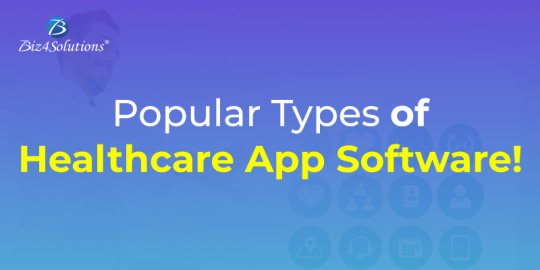
Advancement in technology has opened the door to digital transformation in healthcare. The stakeholders are adopting new technologies to develop scalable, accessible, affordable, and sustainable healthcare solutions. The healthcare industry generates a humungous amount of data from different components including patients, hospitals, trauma care, and labs. Health applications are being introduced to unify and streamline this complex data using technology and the internet. Many medical applications have been developed to connect individuals at different locations with different skill sets and functions. The aim is to solve the problems of medical care with standard software engineering solutions.
Many healthcare apps have been launched in different healthcare domains such as health diagnostics and healthcare informatics. These apps have different designs, functions, and implementations. Here is a list of 12 types of popular healthcare industry applications benefitting the healthcare sector in multiple ways.
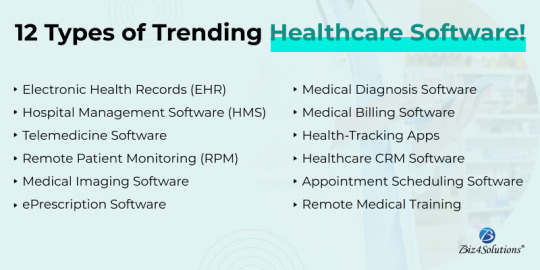
1. Electronic Health Records (EHR)
EHR is one of the emerging technologies in healthcare software applications wherein the healthcare provider and patients can benefit from the ability to electronically exchange and save health information. Healthcare organizations are adopting such technology to provide quality and safe medical care. The quick and up-to-date health-related information enables the healthcare provider to provide efficient and coordinated care. EHR apps bring in reliable, accurate, and streamlined care and billing. These technologies offer high security and privacy to patient data. Besides improved productivity, EHR offers higher efficiency to meet the business goals of any organization. The EHR can be further classified into two popular types – Electronic Patient Record (EPR) Software and Electronic Medical Record (EMR) Software. The former is used to store patient information and the latter is used to record different data such as medical types, medicine dosages, patient procedures, and recovery courses of patients.
2. Hospital Management Software (HMS)
HMS introduces management and information capabilities to help hospitals streamline their processes. HMS often has two separate portals for hospital management and patients. The former acts as a database for all information required for the administration and management of the hospital. The patient portal offers a digital page for registration, billing, insurance, and every other aspect concerning the patients. HMS solutions are known to offer numerous benefits including reduced paperwork, reduced cost, improved user experience, higher data security, streamlined communication, error-free administration, and location-free access to MIS reports. Such healthcare applications promote digital health which proves to be very beneficial in crisis-like situations such as the COVID-19 pandemic where we stressed to implementation of paperless and remote communication.
3. Telemedicine Software
The Telemedicine industry is booming at a fast pace. Statistics suggest that by the end of the year 2025, the industry will value at about $64 Billion. The COVID-19 pandemic has immensely contributed to this growth. Telemedicine is one of the profitable healthcare IT apps that enable patients to communicate with doctors and healthcare providers from remote locations. The patients can get appointments with the healthcare providers and communicate with them using chat messaging, emails, video calls, and telephone calls. It is one of the many profitable healthcare app solutions that facilitate people (elderly people, people with disabilities, and people living in isolated areas) with the potential to connect with healthcare providers from the comfort of their homes. Many healthcare companies are readily hiring healthcare app developers to develop productive solutions and capture consumers from the remote corners of the country.
4. Remote Patient Monitoring (RPM)
Healthcare providers have come up with healthcare solutions to monitor and collect patient data from remote locations. RPM solutions enable healthcare providers to collect health data, conduct diagnoses and alert the doctor in case of any abnormal behavior. Healthcare providers hire healthcare app Development Companyto develop RPMs with unique features that satiates their requirements and business model. Different features of RPM include data analytics, reporting, online doctor-patient communication, and patient data security. These apps also come with text-to-speech functionalities to be used by people with disabilities. Taking a step further, healthcare providers are leveraging the potential of IoT to integrate RPM with different health-tracking wearable devices to keep a check on device failures.
5. Medical Imaging Software
Medical imaging software is gaining traction over its potential to analyze large datasets derived from images. Many radiologists use Machine Learning diagnostic tools with it to process a large volume of data and highlight the details that demand immediate attention from the doctor. These software solutions are also used to develop a customized 3D image of a human body or some specific body part. Such software facilitates the designing of equipment and body components such as coronary stents and prosthetic limbs.
6. ePrescription Software
These are one of the most commonly used healthcare apps. ePrescription software keeps a track of old prescriptions and assists healthcare providers in refilling and generating new prescriptions. This kind of software has become a must-have for doctors, enabling them to track patient history and save time. The ability to send the prescription to the pharmacy in just one click makes these apps very handy and time-efficient. They also notify drug allergies, keep a check on prescription drug errors, monitor the use of the controlled substance, promote paperless culture, and save time on medicine procurement.
7. Medical Diagnosis Software
Of all the medical software solutions and apps used in hospitals, healthcare diagnosis apps offer vast benefits to healthcare providers by offering a holistic view of the patient’s condition. Medical diagnosis healthcare software solutions have an automatic data-sharing feature that connects specialists from different departments and brings them to one platform. Healthcare professionals are integrating Artificial Intelligence in such healthcare software applications to process all the available patient information and provide a probable and potential diagnosis. At the same time, patients can use these apps to find out the severity of their medical condition and the need for medical consultation.
8. Medical Billing Software
Medical billing apps have emerged as one of the key healthcare software development solutions for financial operations. These apps help users manage receipts, invoices, and insurance. Many healthcare institutions integrate these apps with larger systems such as EHR. Many hospitals include this software in their healthcare services. The key features include automated accounting, financial management, claims management, and patient registration. In any integrated health system, such healthcare software gets uninterrupted access to a centralized patient database, that helps in medical coding and billing. Compliance strength is another important feature that boosts any medical billing service by automatically staying updated with the latest billing laws. Healthcare organizations are widening the horizons of their health services by integrating Business Intelligence into medical billing systems to gain business insights regarding revenue generation.
9. Health-Tracking Apps
Most of us must be aware of health-tracking apps that help us track our diet, overall well-being, and fitness. Wearable devices have only escalated the popularity of such medical apps. The mobile health apps industry has flourished over the last many years. The users get accurate health data such as Heart Rate and Oxygen level, enabling them to monitor their lifestyle and daily activities. Besides the trending usage, these apps have proved to be beneficial for patients in recovering from medical ailments. These apps can highlight changes in body parameters and alert the medical staff in case of any abnormal behavior. These health-tracking apps are promoting a healthy lifestyle to the common public.
10. Healthcare CRM Software
Healthcare Customer Relationship Management (CRM) software boosts the doctor-patient relationship by automating and streamlining different services. Medical institutions are using such healthcare app development solutions for patient acquisition and retention. Healthcare CRM software has multiple features including lead management, a patient portal, an appointment scheduler, analytics and reporting, and marketing automation. All these features can help any healthcare institution offer personalized services and achieve its business goals.
11. Appointment Scheduling Software
Health centers and physicians are increasingly adopting appointment scheduling software to streamline and speed up appointment scheduling. Appointment scheduling, sending reminders, rescheduling, and many other activities can be performed using this appointment-scheduling software. Such apps generate a clear picture of the doctor’s schedule. Also, such apps can automate the monotonous and manual work of receptionists and other workers. It comes with a patient-facing panel to be used by patients and a management panel to be used by the medical institution.
12. Remote Medical Training
It is one of the medical software applications that largely benefit the medical fraternity in training and education. Advanced technologies such as Augmented Reality are being integrated into such apps to boost the learning process. Surgery is one of the most beneficial areas. Such healthcare IT solutions are helping healthcare professionals to keep up with continuous medical education and the latest developments in healthcare. These apps are known to be cost-effective tools that cut down the cost of traveling and hiring resources for medical training. Remote medical training software is being used to train medical professionals at a large scale and at a fast pace.
Conclusion
Intelligent healthcare software solutions are simplifying and streamlining the healthcare system with advanced technologies like the Internet of Things (IoT) and Machine Learning (ML). These healthcare apps are positively influencing every aspect from appointment scheduling to patient recovery. Special attention has been given to improving communication between different stakeholders, healthcare providers, and patients. These healthcare IT solutions are reducing the workload of hospitals and other healthcare institutions. They have proven to be cost-effective, time-efficient, intelligent, resource-optimized, and sustainable, ready to cater to a large population.
Healthcare industry software applications have been trending and opening doors to new opportunities for revenue for healthcare institutions. Stepping into healthcare app development can prove to be a great move, given every component from market research to user testing is taken care of. For developing a profitable and HIPAA-compliant medical solution, it’s advisable to partner with a proficient software development company with domain-specific experience. An experienced firm can help you develop scalable and sustainable medical software that takes you closer to your business goals with every step.
0 notes
Text
7 Mistakes to Avoid in Telemedicine Application Development
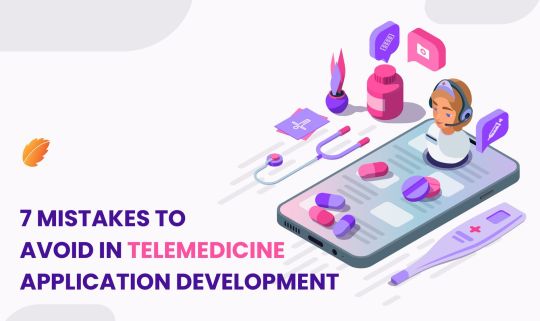
With rising inflation, decreasing hospital expenditure, and broad market uncertainty, it is critical that the Telemedicine app development company keep informed about the industry's future to prioritize their investments effectively. As we have already moved to a new year, we should be aware of things that will drive the telemedicine device market in 2023.
During the Covid-19 pandemic, people demanded the quick adoption of virtual treatments. The need for asynchronous treatment has persisted as it helps patients save time and money.
Telemedicine adoption is here to stay. The Telemedicine Market was worth USD 67.3 billion in 2021 and is expected to increase to USD 82.17 billion in 2022 and USD 405.93 billion by 2030. Today, most healthcare consumers utilize telehealth, and in the years to come, its adoption will continue to increase for virtual treatment. Consumers will continue to demand asynchronous virtual health care as now they are habitual to utilizing them.
So if you want to succeed in the healthcare industry, you should hire experienced Telemedicine app development services. Qualified Telemedicine app developers can help you to avoid some basic mistakes in developing Telemedicine app development and launch a feature-rich Telemedicine App, avoiding future tweaking.
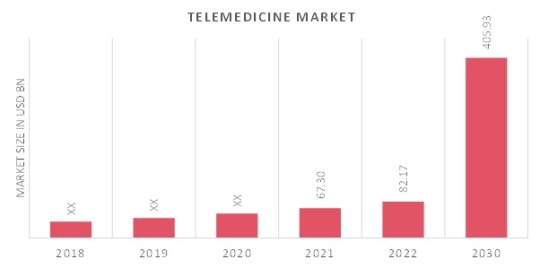
Mistakes to Avoid in Telemedicine App Development
According to Harvard Business Review, businesses spend more than $2 trillion on acquisitions each year. Despite this, acquisitions fail at a rate of 70% to 90%. To win the customer’s trust and motivate them to use your mobile application, you must achieve the synergy required for success. Many companies still need help with technology integration. Technology silos, redundant systems, and complex procedures all restrict genuinely audience-centric experiences. Here is a list of mistakes you should avoid during Telemedicine app development.
Ignoring User Experience:
The user experience is critical in any app, but it's especially important in telemedicine apps where patients need to feel comfortable using the technology. Ensure your app is intuitive and easy to use, with clear navigation and a user-friendly interface. Today's healthcare customers demand the same level of digital involvement from their care teams as from firms in other sectors. According to Forbes, half of healthcare consumers think a lousy digital experience may damage their overall experience with a provider, and one-quarter would switch providers for high-quality digital services. Telemedicine app developers with previous experience in offering Telemedicine app development services can save you from this mistake.
Neglecting Data Security and Privacy:
Telemedicine apps handle sensitive patient information, so it's crucial to have robust security measures in place to prevent data breaches. Ensure that your app uses encryption to protect patient information and that your servers are secure. Data security is an issue that affects many sectors, but it is especially vital in telemedicine. To safeguard patients and doctors, patient data must be kept secret and secure at all times. Fortunately, there are several methods for keeping information secure, and healthcare practitioners should use all of them. Telemedicine app development services providers can maintain the security of their patients' data by utilizing cutting-edge technologies and best practices.
Skipping the Testing Phase:
Testing is essential in any app development process, and telemedicine apps are no exception. Thorough testing will help you identify and fix any bugs or issues before the app is released to the public, improving the app's overall quality. Testing and Quality Assurance (QA) is essential for giving the green flag to the mobile app development process. Despite being aware of its importance, many people need to pay attention to this stage when working on a mobile app development project; as laptop/desktop internet use decreases, mobile internet use increases. A growing number of people are spending more time on their mobile devices. As a result, your app must provide superior experiences. Regardless of the sort of app you use, mobile app testing offers a fantastic mobile experience. To achieve effective app development, QA should be included at every stage of the Telemedicine app development services, from content creation to evaluating project needs, developing test specs, and deploying final applications.
Not Keeping Up with Regulations and Standards:
Telemedicine is regulated, and Telemedicine app developers must stay up-to-date with the latest regulations to avoid legal trouble. Make sure your telemedicine app complies with HIPAA regulations and other relevant standards to ensure patients’ safety.
Neglecting Scalability:
As the app's usage grows, it's important to ensure that the infrastructure can handle the increased demand. Plan for scalability and ensure your app is built on a platform that can grow and evolve. Choosing the right platform for your phone is just as crucial as any other consideration. Most of the time, users are sure about the platform they want for their project, but there are always exceptions. You must be thoroughly familiar with all the platforms before deciding which is best suited for your app. If you want to reach a larger audience, you should publish your app on one of the major platforms, such as iPhone development, Android development, or Windows development. It will assist your program in gaining a larger user base, which is critical in today's industry.
Failing to Integrate with Existing Systems:
Telemedicine apps must seamlessly integrate with existing healthcare systems, such as electronic health records, to ensure seamless and efficient patient care. Ensure that your app integrates with existing systems and that data is easily transferred between them to avoid disruptions in care.
Failure to focus on marketing
It is a critical aspect that can be the difference between a hit and a failure. Marketers should continuously strive to advertise their software since a little buzz may make all the difference. You should utilize your social media accounts to market your app, and you can even ask your friends to contribute their ideas and replies about what improvements they would want to see in the app. Make a buzz about your app so that you have a ready-made market for your app and don't have to put in extra effort afterward. However, be certain that you live up to the expectations.
Conclusion
These seven mistakes are just a few of the many challenges that Telemedicine app developers
face when developing telemedicine apps. By avoiding these mistakes, you can ensure the success of your app and provide patients with the best possible experience.
Any Telemedicine app development company, which has traditionally been focused on production, must reinvent itself and focus on generating end-to-end client value that involves more than just goods. The Telemedicine app development company must provide comprehensive solutions incorporating services, data insight, and integrated product offers to develop new income streams, decrease expenses, and minimize hospital admissions.
Proficient Telemedicine app development services can help you reinvent-
core business strategies for evolving markets,
market opportunity assessments,
technical roadmaps,
data intelligence,
commerce,
platform integration,
interoperability, and more,
transforming themselves into a single strategic partner driving value throughout the consumer lifecycle.
Consagous, a trusted Telemedicine app development company with extensive app development services and deep knowledge of mobile app development, has served more than 80 + pharmaceutical, biotechnology, medical device, and clinical research businesses. Our industry expertise and experience working with top technological developers deliver unique products that work best to meet clients’ visitation and create a revolution in the industry. To learn more, please get in touch with us.
Original source: https://www.consagous.co/blog/7-mistakes-to-avoid-in-telemedicine-application-development
0 notes
Text
Squillion - healthcare app development company
With Squillion Technology, we're utilising the power of app development to improve the accessibility, effectiveness, and patient-centricity of the healthcare system. To provide customers with the greatest convenience, we create healthcare apps with essential functions like appointment scheduling, patient record management, telemedicine services, and much more.
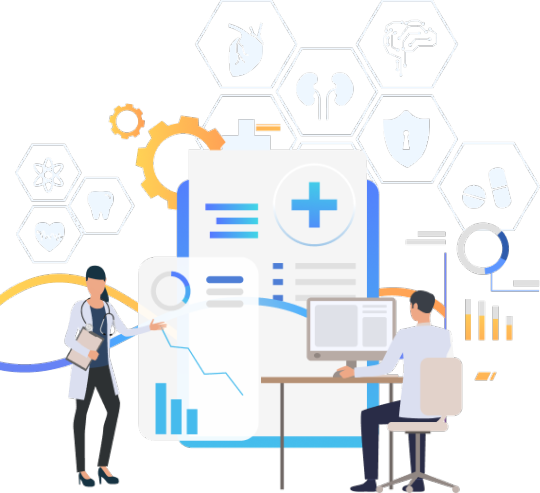
0 notes